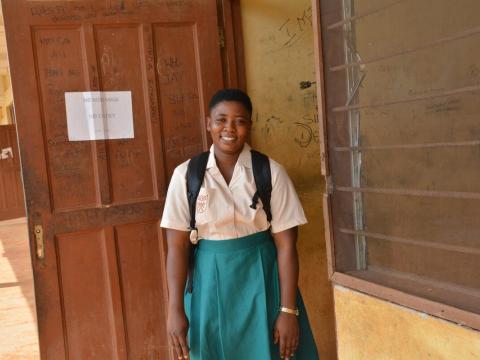Ayesha’s story: creating her own opportunities in Ghana

As the youngest in a family of nine siblings with none continuing to Secondary School level, Ayeshaitu was determined to fight for her education. After failing her first BCE exam three years ago, Ayeshaitu, now 20, joined the community savings group and has used her earnings to retake her exam and get into secondary school.
By Abena Agyei-Boateng, Communications Officer, World Vision Ghana
“There is a lot of poverty here and that leads to child marriages,” Ayeshaitu explains from her village in Ghana’s cocoa-growing Ashanti region. “I have nine siblings and I am the last-born. Four are girls. Two are married and one works because they were not able to further their education.” Ayesha was determined that she wouldn’t fall into the same trap.
“Only the boys went to SHS because of poverty. I believe that we girls should have furthered our education so we get better jobs, but my other sisters were unable to do this. I have taken it upon myself to ensure that I improve my life.”
Ayesha failed her secondary school entrance exam the first time she took it three years ago, but was determined it would not be the end of her education. A women’s savings group had recently been formed by World Vision’s Cocoa Life programme in her community, and Ayesha saw a chance to give herself the best possible chance of finishing her education.
Isaachar, the Savings for Transformation group coordinator in the community explained, “The constitution of the savings group usually allows for people 18 years and older. However, we had to make an exception for Ayeshaitu because we saw that she was very determined to improve her life. There are many young ladies who are getting pregnant in the community because they are following men who promise them a better future.”
The government in Ghana recently made secondary school free for any qualifying students, but there are still many associated costs that poorer families struggle to meet, including uniforms, textbooks, and lunches. When parents struggle to support their children, they often take up small jobs selling on the side of the road where they are then vulnerable to abuse and transactional relationships.
“Due to poverty, many girls who get pregnant are forced to get married early. I did not want that for myself,” Ayesha finishes. “I wanted to go to school and so I started my savings and used the money I earned to pay for the things I needed for school.”
Back in school, and now able to cover her own needs, Ayesha seems sure to achieve her dream of becoming a military woman. “I aspire to be an example for young girls in similar conditions like mine in small communities. It’s possible to get to the top once you are determined,” Ayesha smiles.
World Vision's recent report COVID-19 and child marriage: How COVID-19's impact on hunger and education is forcing children into marriage examines the ways in which hunger, access to education, poverty, parental support and general well-being are all linked to child marriage. Stories like Ayesha's show the inspiring difference girls can make to their own lives, but also why a cross-sectoral approach to ending child marriage is so necessary.